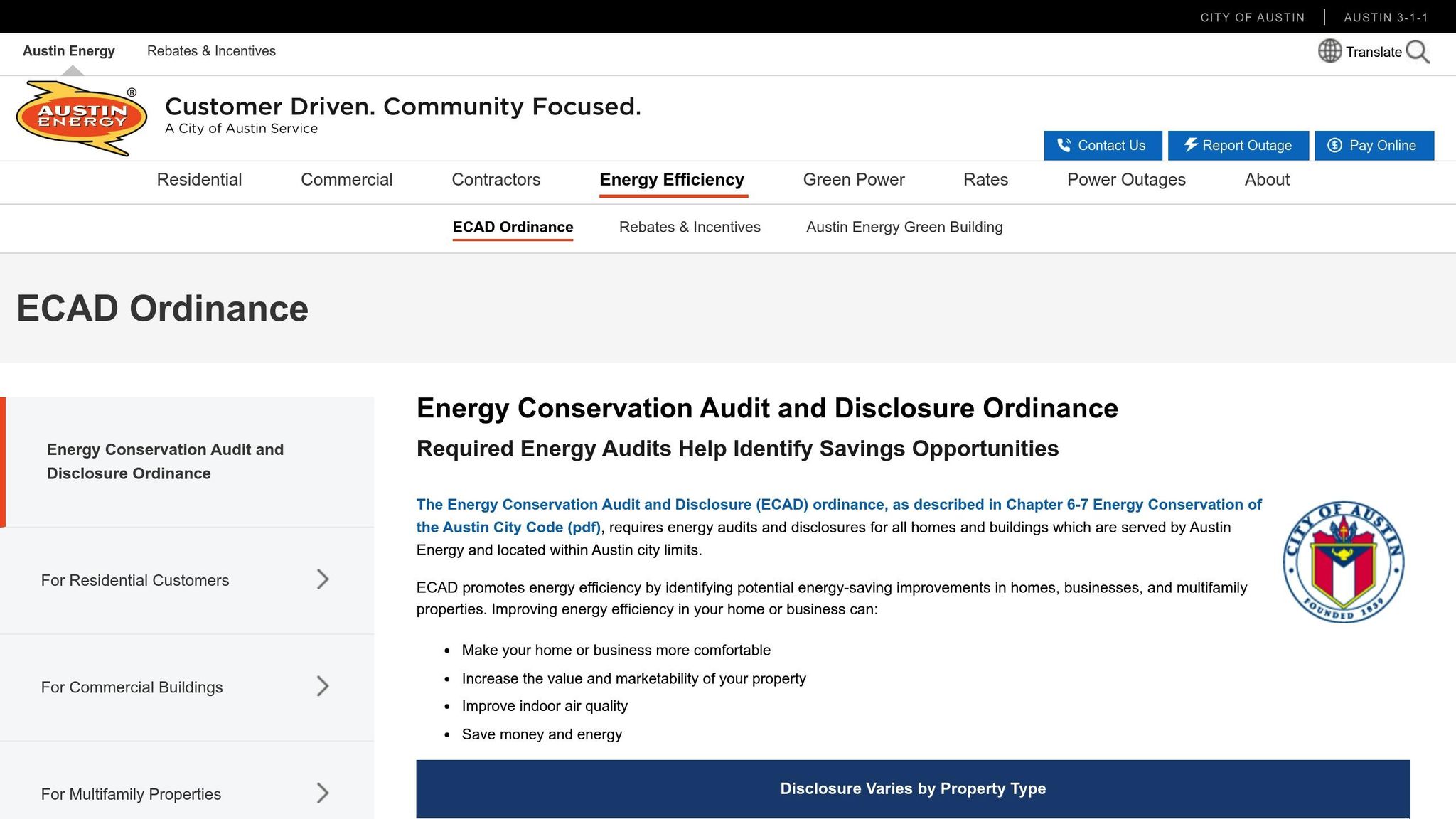An ECAD audit is a home energy efficiency inspection required in Austin, Texas, under the Energy Conservation Audit and Disclosure (ECAD) ordinance. It evaluates a property’s energy performance, identifying areas for improvement and potential cost savings. This process is essential for most home sales in Austin and helps homeowners and buyers understand energy usage, reduce expenses, and comply with local regulations.
Key Takeaways:
- Purpose: Assess energy efficiency and recommend upgrades.
- Benefits:
- Helps buyers estimate utility costs.
- Provides upgrade suggestions for cost savings.
- Increases home value and market appeal.
- Who Needs It: Most Austin homes, with some exceptions (e.g., newer homes or those with recent upgrades).
- Process:
- Hire a certified auditor.
- Complete the inspection.
- Review the findings and recommendations.
- Compliance: Required for home sales; non-compliance may result in fines or delays.
An ECAD audit not only streamlines real estate transactions but also supports energy conservation efforts in the community.
ECAD Audits in Austin Texas. What the heck is that? What you …
ECAD Audit Benefits
Energy Insights for Buyers
An ECAD audit provides a clear picture of a property’s energy performance, covering areas like insulation, HVAC system efficiency, and air leakage. This information helps buyers understand potential utility costs upfront.
A standard ECAD report typically includes:
- Suggested energy efficiency upgrades
- Estimated annual energy expenses
- Comparisons of energy performance with other properties in Austin
These details help uncover ways to cut costs and improve efficiency.
Cost Savings and Rebates
Many local utility programs in Austin offer rebates for energy upgrades such as improved insulation, duct sealing, or HVAC system enhancements. These rebates help lower energy expenses while making a property more efficient. Plus, an ECAD audit can increase a property’s overall appeal.
Boosting Home Value and Comfort
Energy-efficient homes are in higher demand in Austin’s market. Properties with documented energy upgrades not only attract more buyers but also offer improved indoor comfort. Addressing the recommended improvements can reduce future maintenance needs and make the home more appealing to potential buyers.
sbb-itb-4c99469
ECAD Rules and Steps
Required Properties and Exceptions
ECAD regulations apply to most homes in Austin, but there are exceptions. Homes that are newer, face financial or renovation hurdles, or have undergone a recent audit might not need to comply. For multi-family properties, there are specific rules about making audit results accessible and posting them as required. Once exemptions are understood, the audit process itself is straightforward.
Audit Process Guide
The audit involves three main steps:
- Find a certified local auditor: Look for professionals approved to conduct the inspection in your area.
- Schedule and complete the energy inspection: Book an appointment to assess your home’s energy efficiency.
- Review the report: Get a detailed breakdown of your home’s energy performance and recommendations for improvement.
Rules and Fines
Failing to comply can lead to legal and financial consequences. Homeowners are responsible for keeping audit records, documenting energy upgrades, and meeting local deadlines to avoid penalties. Accurate and up-to-date records are essential.
ECAD Audit Costs and Effects
Effects on Home Sales
ECAD compliance plays a key role in Austin’s real estate market. A completed ECAD audit is required before closing, and properties that don’t meet this requirement can experience delays or complications in the sale process. Additionally, non-compliance may lead to penalties. Meeting ECAD standards not only helps avoid these issues but also makes the sales process smoother and increases buyer confidence. This requirement highlights the importance of ECAD audits in improving both a property’s appeal and its potential for long-term energy savings.
Conclusion
Main Points
ECAD audits are a key part of Austin’s efforts to maintain energy efficiency and play an important role in real estate transactions. These audits evaluate a property’s energy performance, helping homeowners pinpoint areas for improvement. By ensuring compliance with ECAD requirements, Austin upholds high energy standards, benefiting both individual homeowners and the wider community. This highlights the importance of having expert guidance throughout the process.
Austin Local Team Support
With ECAD audits now an integral part of home transactions in Austin, Austin Local Team connects homeowners with experienced local agents. Their matching service pairs you with agents who understand ECAD compliance and can guide you through it seamlessly. They also offer free home evaluations, providing insights into your property’s value while considering energy upgrades that could enhance its market potential.







